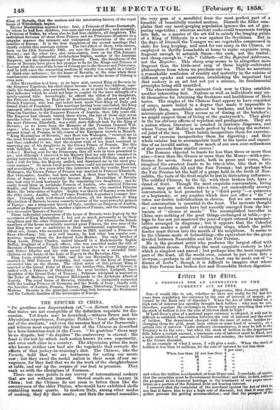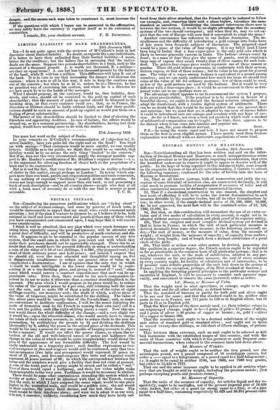Irttrrou tlit attar.
A PROPOSAL FOR AN ALTERATION OF THE CURRENCY ACT OF 1844.
Ningweston, 26th January 1858. Sin—I would like to ask, whether we have not really for the last few years been regulating the currency by the rate of interest of money, go- verned by the Bank rate of discount ? When the Act of 1844 failed us, a high rate of interest has speedily brought back bullion : why may we not, therefore, regulate the exchanges in future by merely providing that when the stock of bullion is low the rate of interest shall be high ? If Lord Grey's plan of a national paper currency is adopted, it will not be difficult to establish this relation between'the rate of interest and the stock of. bullion. The department charged with the issue of notes, besides ex- changing them for gold, must issue others on some kind of security at a certain rate of interest. Under ordinary circumstances, it may be left the Treasury to fix the rate ; but when the stock of bullion in the department falls below a certain amount, a minimum rate of interest must be fixed, and a scale established of amounts of bullion and minima the latter increasing as the former diminish. As an example of what I- mean, I will give a scale. When the stock of bullion is less than 14 millions, let the rate of interest be not less.tban
3 percent; When less than 12 not leas than 4 „ „ 10
„ 5
If 11
8
21
6
4
2 and when the bullion is exhausted, at least 10 per cent. I conclude of course, that the securities must be Government Seeurities and this, in fact, reduces the proposal in its financial bearings to the treatment of our paper circu- lation as a portion of the National Debt not bearing interest.
I conceive that the complaint of the merchant against the Act of 1844 is, not. that it forces him to pay a high rate of discount, but that it may alto- gether prevent his getting accommodation ; and that the prospect of the danger, and the means each man takes to counteract it, must increase the danger. If the questions with which I began can be answered in the affirmative, we may safely leave the currency to regulate itself as to its extension or contraction.
I remain, Sir, your obedient servant, F. II. DICKINSON.



































 Previous page
Previous page